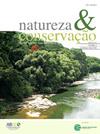Positive effects of an Atlantic Forest program of payment for ecosystem services on native vegetation and pasture quality
IF 3.5
2区 环境科学与生态学
Q1 BIODIVERSITY CONSERVATION
引用次数: 0
Abstract
In recent decades, Brazil has implemented several payments for ecosystem services (PES) programs, including the Projeto Conexão Mata Atlântica (PCMA), a partnership between the Brazilian federal government, the states of São Paulo, Minas Gerais and Rio de Janeiro and the Global Environmental Facility. The PCMA was co-designed by state organizations with many stakeholders, including landowners. The innovative polycentric approach of the program prompted exploration of different schemes, including one to conserve and restore natural vegetation cover (‘protection scheme’) and another to enhance the multi-functionality of individual properties with focus on pasture quality (‘multiple-use scheme’). Using a propensity score matching approach, we assessed the PCMA’s effects on natural vegetation cover and pasture quality of private rural properties that did and did not participate in this PES program between 2017 and 2022. Properties participating in the ‘protection scheme’ exhibited an average ‘additional’ increase in natural vegetation cover of 1 ha compared to non-participants. Properties participating in the ‘multiple-use scheme’ exhibited 7–10% less pasture quality degradation. These results suggest that the PCMA not have only contributed to maintaining and even increasing ecosystem services (through increases in natural vegetation), but also potentially creating economic benefits by enhancing pasture quality which indirectly improves soil conservation and water quality.

大西洋森林生态系统服务付费计划对原生植被和牧草质量的积极影响
近几十年来,巴西实施了几个生态系统服务付费(PES)项目,包括巴西联邦政府、圣保罗州、米纳斯吉拉斯州和巴西里约热内卢州与全球环境基金之间的合作项目conexto o Mata atlntica (PCMA)。PCMA是由国家组织与包括土地所有者在内的许多利益相关者共同设计的。该项目创新的多中心方法促使人们探索不同的方案,包括保护和恢复自然植被覆盖(“保护方案”),以及提高单个物业的多功能性,重点关注牧场质量(“多用途方案”)。使用倾向得分匹配方法,我们评估了2017年至2022年间参与和未参与该PES计划的私人农村财产的PCMA对自然植被覆盖和牧场质量的影响。与未参与“保护计划”的物业相比,参与“保护计划”的物业的自然植被覆盖平均“额外”增加了1公顷。参与“多用途方案”的牧场表现出7-10%的牧场质量下降。这些结果表明,PCMA不仅有助于维持甚至增加生态系统服务(通过增加自然植被),而且还可能通过提高牧草质量间接改善土壤保持和水质而创造经济效益。
本文章由计算机程序翻译,如有差异,请以英文原文为准。
求助全文
约1分钟内获得全文
求助全文
来源期刊

Perspectives in Ecology and Conservation
Environmental Science-Nature and Landscape Conservation
CiteScore
7.80
自引率
4.30%
发文量
46
审稿时长
59 days
期刊介绍:
Perspectives in Ecology and Conservation (PECON) is a scientific journal devoted to improving theoretical and conceptual aspects of conservation science. It has the main purpose of communicating new research and advances to different actors of society, including researchers, conservationists, practitioners, and policymakers. Perspectives in Ecology and Conservation publishes original papers on biodiversity conservation and restoration, on the main drivers affecting native ecosystems, and on nature’s benefits to people and human wellbeing. This scope includes studies on biodiversity patterns, the effects of habitat loss, fragmentation, biological invasion and climate change on biodiversity, conservation genetics, spatial conservation planning, ecosystem management, ecosystem services, sustainability and resilience of socio-ecological systems, conservation policy, among others.
 求助内容:
求助内容: 应助结果提醒方式:
应助结果提醒方式:


